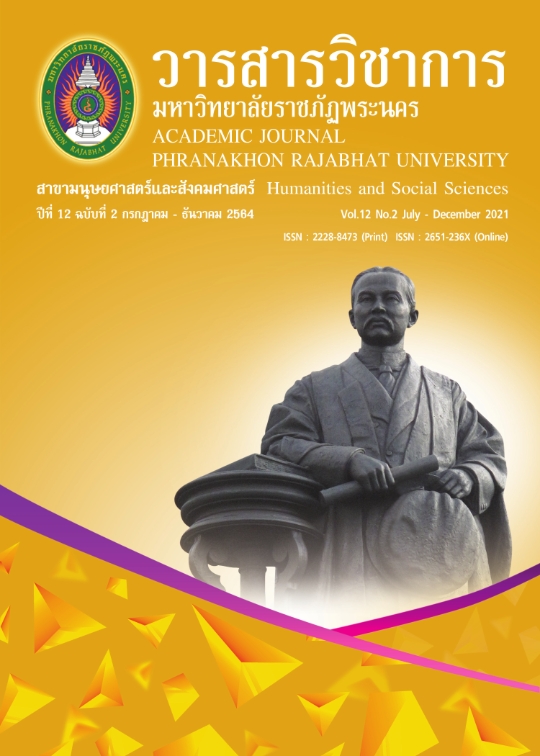GUIDELINES FOR DRIVING PROFESSIONAL LEARNING COMMUNITY OF SCHOOLS UNDER THE SECONDARY EDUCATIONAL SERVICE AREA OFFICE NONTHABURI
Keywords:
Professional Learning Community, Driving PLCAbstract
This research aimed to 1) study the school administrators and teachers’ opinions on the movement of professional learning communities (PLC), 2) compare the PLC movement, and 3) study the guidelines for driving PLC of schools under the Secondary Educational Service Area Office Nonthaburi. The samples were 334 administrators and teachers, selected by a stratified randomization method. The research instrument was a questionnaire with a consistency (IOC) of 0.89 and an alpha coefficient of 0.98. Data were analyzed by mean, standard deviation, t-test, one-way ANOVA, LSD and content analysis. The research findings revealed that the school administrators and teachers’ opinions on enhancing a professional learning community all of 6 elements were at a high level, arranged in descending order as shared vision ( =4.21, S.D.=.59), collaborative teamwork ( =4.18, S.D.=.66), professional learning and development ( =4.16, S.D.=.64), support structure ( =4.12, S.D.=.66), shared leadership, and caring community ( =4.12, S.D.=.70) respectively. When comparing the opinions classified by personal data, it was found that gender, educational level, year of service and position had no different opinion while difference in opinions was found in the aspect of age and school size with a statistically significant difference at .05 level. The 3 successions how to success in PLC were: allowing teachers to group by their interests, having the committees to drive PLC systematically, and setting the PLC period in the teaching schedule. The role of administrators is essential to drive PLCs in schools. They should support the implementation of the activities by educating and training teachers to understand clear methods, providing advice and monitoring regularly
References
Amata, J. (2020). A Guidline for the Development of Professional Learning Community Operation in Schools under the Nonthaburi-Phra Nakhon Si Ayutthaya Secondary Educational Service Area Office 3. (Master’s thesis).
Rangsit University, Pathum Thani. (in Thai)
DuFour, R. (2004). Schools as learning communities. Educational Leadership, 61(8): 6-11.
Hord, S.M. (1997). Professional Leaning Communities: Communities of continuous inquiry and improvement. Austin: Southwest Educational Development Laboratory.
Kualthida, T. (2018). Learning Process Development of Professional Learning Community (PLC) in Context of Faculty of Education, Bansomdejchaopaya Rajabhat University. Rajabhat Rambhai Barni Research Journal, 12(1), 79-89. (in Thai)
Laddawan, P. & et al. (2019). Statistics for research and techniques in the use of SPSS. 3rd revised edition). Bangkok: Prosperous and Prosperous Printing. (in Thai)
Napajit, D. & Panita, W. (2020). Professional Learning Community Training Model via Cloud Technology to Enhance Teacher Competence. Technical Education Journal: King Mongkut’s University of Technology North Bangkok, 11(3), 163- 172. (in Thai)
Pranee, C. & Rungchatchadaporn, W. (2018). Being a community of professional learning Educational institutions according to the opinions of teachers Under the Primary Education Service Area Office Songkhla District 1. The 10th Walailak Research National Conference. Retrieved from https://research.wu.ac.th/wp-content/uploads/2018/03/Abstracts-Book-2018-version-1.pdf [2020, 20 Jun.]
Pongthip, T. & Marut, P. (2014). Developing a community model for vocational learning for elementary school teachers. Silpakorn Education Research Journal, 6(2), 284-296. (in Thai)
Rungchatchadaporn, W. (2018). Analyze the composition of the Professional Learning Community (PLC). Veridian E-Journal, Silpakorn University, 11(3), 2774-2793. (in Thai)
Sangrunee, M. (2020). Professional Learning Community (PLC): A Way to Develop the Teacher Profession. Journal of Education, Mahasarakham University, 14(2), 20-32. (in Thai)
Sureerat R. (2017). School Administration Affecting Propulsion of Professional Learning Community in Nakornpathom Primary Educational Service Area1. (Master’s thesis). Ratchaphruek University, Nonthaburi. (in Thai)
Thapanut, U. (2011). The School Management Model to Enhance the Professional Learning Community in Classroom Action Research. (Doctoral dissertation). Chulalongkorn University, Bangkok. (in Thai)
The Secondary Educational Service Area Office Nonthaburi. (2018). Annual Report 2018. Retrieved from https://www.spmnonthaburi.go.th/main/ news/9334.html [2020, 20 Jun.] (in Thai)
Wassana, T. & Tongluck, B. (2019). Factors Affecting the Professional Learning Community of Teachers in Secondary Schools, Pathum Thani Province. Journal of Rangsit University: Teaching & Learning, 13(2), 123- 134. (in Thai)
Downloads
Published
How to Cite
Issue
Section
License
"บทความวิชาการในวารสารฉบับนี้ ถือเป็นความรับผิดชอบของผู้เขียนเท่านั้น"
สงวนลิขสิทธิ์ตามพระราชบัญญัติลิขสิทธิ์




